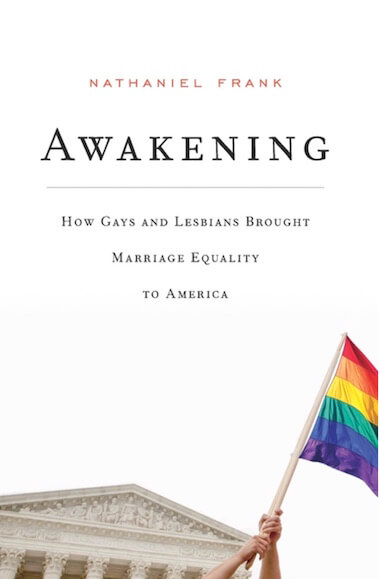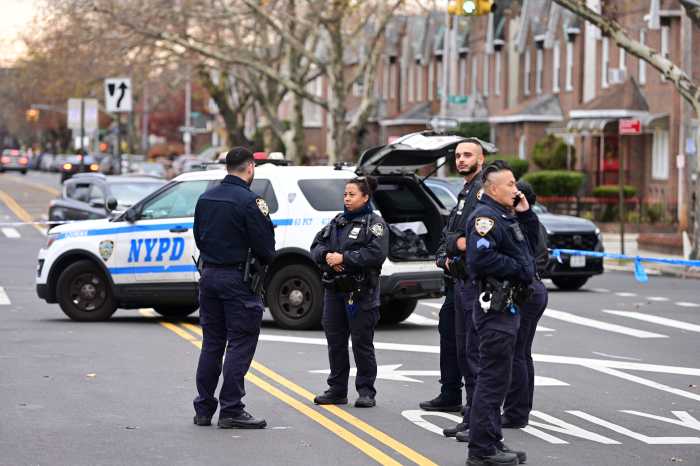COVER DESIGN BY MICHAEL SHIREY
Some gay and lesbian Americans, panicked by the election of Donald Trump, have been calling LGBT advocacy groups asking whether they should accelerate their wedding plans to marry before he takes office in January, many expressing concern that the marriage equality victory, won in the Supreme Court in June 2015 after so much hard work and heartache, is now in danger of being reversed. Some who are married have worried that their unions might become invalid.
Nobody can predict the future with absolute certainty, but it is highly unlikely that the marriage equality decision will be reversed. It is, however, an absolute certainty that Trump as president will not have the authority to reverse it on his own or even with the connivance of Congress, a reality he was perhaps conceding in his first post-election interview November 13 on “60 Minutes” when he said he was “fine” with last year’s ruling which “settled” the matter.
Even if some future Supreme Court were to buck the strong odds and reverse its 2015 decision, there is good legal authority to conclude that a valid marriage, once contracted, can only be ended by a divorce or by the death of one of the spouses, not through executive fiat, legislative action, or even a court’s ruling.
Trump, whatever his inclinations, can’t act unilaterally; Congress, even the Supreme Court also pose little threat
The Supreme Court’s 5-4 ruling last year in Obergefell v. Hodges relied on the liberty guaranteed under the 14th Amendment of the US Constitution, bolstered by the constitutional guarantee of equal protection of the laws. A high court ruling on a constitutional right can only be changed in one of two ways: a constitutional amendment or an overruling by the Supreme Court in a later case. The period for a rehearing of Obergefell itself has passed; it is final, done, no longer open to reconsideration by the court.
During the campaign, Trump never threatened to try to repeal or reverse the ruling on his own, though he said he believed the question should have been left to the states and so disagreed with it. Significantly, he did say he would consider appointing new justices who would vote to overrule it. Indeed, those on his list of nearly two-dozen potential appointees were uniformly conservative, with some outspoken critics of gay rights.
With the Senate’s refusal to take up DC Circuit Court of Appeals Judge Merrick Garland as President Barack Obama’s nominee to fill the vacancy left by Justice Antonin Scalia’s death early this year, Trump has an immediate chance to name a new justice. Scalia, of course, dissented in the Obergefell case, so replacing him with a conservative judge wouldn’t change the math on marriage equality among the nine justices. The five-member majority in Obergefell — Justices Anthony Kennedy (who wrote the Court’s opinion), Ruth Bader Ginsburg, Stephen Breyer, Sonia Sotomayor, and Elena Kagan — are all still there. And there is no case now pending before the court that would provide a vehicle for overruling Obergefell. Any marriage equality opponent thinking strategically would be waiting until one of those majority justices leaves before attempting to launch a legal challenge.
In the meantime, what about the constitutional amendment route? That is not going to happen. Trump’s election doesn’t affect that at all, since the president plays no role in amending the Constitution. Article V makes it so difficult to pass an amendment that the 240-year-old Constitution has picked up only 27 amendments, 10 of them being the Bill of Rights adopted in 1791, and the most recent one, adopted in 1992, a quarter century ago, requiring that any pay raise Congress votes for itself not go into effect until after the next House of Representatives election. New amendments must first get the approval of at least two-thirds of each house of Congress, and then it has to be ratified by at least three-quarters of the 50 states. Alternatively, two-thirds of the states can apply to Congress to call a Constitutional Convention, but any amendments proposed would still require ratification by 38 states or more.
By the time the Supreme Court decided Obergefell in 2015, popular opinion polls showed that a clear majority of the public supported marriage equality, and that margin of support only increases over time, as polling in the early marriage equality states such as Massachusetts has shown. Amendments to the Constitution can only pass with overwhelming public support, which is nowhere close to existing regarding the abolition of marriage equality. Even a decade ago, when same-sex marriage was considerably less popular, Democrats were able to erect a firewall against the constitutional amendment that then had the support of President George W. Bush. Any effort in this direction is now the province of far-right-wing cranks and religious fanatics.
The US Supreme Court, pictured before the death of Justice Antonin Scalia (front, second from left), with three members of the Obergefell majority – Ruth Bader Ginsburg (front, right), Anthony Kennedy (next to Ginsburg), and Stephen Breyer (rear, second from left) – being the oldest of the surviving eight members. | US SUPREME COURT
The alternative for opponents is waiting for a second conservative appointee — by Trump or a successor – and then setting up a lawsuit to put the question once more before the court. Of greatest concern, on this point, is that the five-member Obergefell majority includes the three oldest members of the court — Ginsburg, Kennedy, and Breyer. It is not hard to imagine that Trump, in a four-year term, could shape a court with a majority whose sympathies are not with Obergefell.
Even then, however, an overruling is highly unlikely.
First, a case, with marriage equality central to the question presented, would have to arrive at the high court. There is already a petition to review the Colorado wedding cake case, presenting the claim that a baker’s First Amendment rights are violated by fining him under a state anti-discrimination law for refusing to provide his services to a gay couple. The heart of this case, however, is free speech rights, and I doubt it would provide a vehicle for reconsidering and thereby overruling Obergefell itself.
More likely, a challenge would come from some state deciding to provoke a lawsuit by denying equal treatment for some benefit to married same-sex couples. Lower courts hearing such a case would be obliged to apply last year’s precedent, so the aim of marriage equality opponents would be for the Supreme Court to hear an appeal of a lower court doing so. It’s not enough, however, just to petition the high court, which has complete discretion about whether to accept a case for review. It takes four justices to grant such a petition.
By the time the court’s composition could be altered to achieve a majority unfriendly to Obergefell, perhaps several years from now, same-sex marriage will be such a settled issue, with so many hundreds of thousands of same-sex couples married throughout the country, that it is highly improbable that even the four conservative members the court is likely to have when Scalia’s seat is filled would be motivated to reopen the question.
Beyond those logistics, there is the tradition of “stare decisis,” a Latin term that means standing by what has been decided. The Supreme Court is very reluctant to overrule itself, especially when a decision has been embraced by society and incorporated into the everyday lives of many people. When justices do overrule a prior decision, it is usually in the direction of realizing that a prior ruling wrongly denied a constitutional claim or adopted an incorrect and harmful interpretation of a law. The high court resists attempts to get it to cut back rights it has previously recognized.
In the history of LGBT rights litigation, the Supreme Court has twice overruled past decisions — in both cases in the direction of expanding rights. In 2003, it overruled the notorious 1986 Bowers v. Hardwick sodomy decision when it decided, in the Lawrence v. Texas case, that the Constitution protects people engaged in consensual gay sex from criminal prosecution. There, the court said Bowers was wrong when it was decided. Last year, when deciding Obergefell, it overruled its 1972 Baker v. Nelson decision. Baker, however, was a one-sentence decision stating that the issue of same-sex marriage did not present a “substantial federal question” and was issued in conjunction with the court’s refusal to hear an appeal of a Minnesota Supreme Court decision that denied equal marriage rights to a gay couple.
Significantly, in both cases, the overruling involved a determination that a prior finding had wrongly failed to recognize a constitutional right, so the new decision marked an expansion of liberty and equality. The court is unlikely to overrule a case in order to contract liberty or deny equality.
Finally, on the question of whether a reversal of equal marriage rights would invalidate existing same-sex marriages, the action of the California Supreme Court in the wake of Proposition 8’s enactment in 2008 is instructive. There, the court concluded that even though Prop 8 was validly enacted, it could not retroactively “un-marry” couples who had already wed. It is unlikely that the US Supreme Court would take a different position regarding existing same-sex marriages even if it were to overrule Obergefell because of the daunting due process and equal protection questions that would raise.
Trump’s taking office does not present a direct and current threat to marriage equality. That conclusion should take nothing away from the valid concerns about the likelihood that his presidency will involve the loss of pro-LGBT executive orders issued by Obama and the abandonment by federal agencies of the position that sex discrimination laws protect LGBT people from sexual orientation and gender identity discrimination (see this writer’s analysis in the previous issue of Gay City News ). Those are the likely key battlegrounds for the community in the days to come.



















